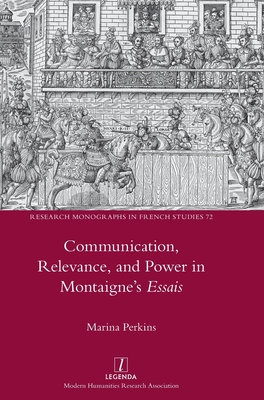Communication, Relevance, and Power in Montaigne's Essais

Communication, Relevance, and Power in Montaigne's Essais
Readers of the Essais of Michel de Montaigne (1533-92) have long dissected how the text communicates with its audience, devoting particular attention to its digressive style and the extent to which it operates as a dynamic portrait of the author. But how does Montaigne conceive of human communi-cation in the world beyond the author and his audience, in settings where it influenced the social and political structures of France during a period rife with sectarian conflict? Taking up this question, Perkins makes use of a theoretical framework rooted in relevance theory, a cognitively-inflected account of utterance interpretation in the field of pragmatics, to trace patterns in Montaigne's portrayals of communication across four domains: conversation, diplomacy, jurisprudence, and exegesis and prayer. Contextualizing Montaigne's views within the broader landscape of Renaissance intellectual history, this study represents the intersection of cognitive approaches to literary criticism and analysis attentive to dynamics of power and politics in early modern Europe.
Marina Perkins is a post-doctoral fellow at The Queen's College, Oxford.
PRP: 968.75 Lei
Acesta este Prețul Recomandat de Producător. Prețul de vânzare al produsului este afișat mai jos.
775.00Lei
775.00Lei
968.75 LeiIndisponibil
Descrierea produsului
Readers of the Essais of Michel de Montaigne (1533-92) have long dissected how the text communicates with its audience, devoting particular attention to its digressive style and the extent to which it operates as a dynamic portrait of the author. But how does Montaigne conceive of human communi-cation in the world beyond the author and his audience, in settings where it influenced the social and political structures of France during a period rife with sectarian conflict? Taking up this question, Perkins makes use of a theoretical framework rooted in relevance theory, a cognitively-inflected account of utterance interpretation in the field of pragmatics, to trace patterns in Montaigne's portrayals of communication across four domains: conversation, diplomacy, jurisprudence, and exegesis and prayer. Contextualizing Montaigne's views within the broader landscape of Renaissance intellectual history, this study represents the intersection of cognitive approaches to literary criticism and analysis attentive to dynamics of power and politics in early modern Europe.
Marina Perkins is a post-doctoral fellow at The Queen's College, Oxford.
Detaliile produsului









